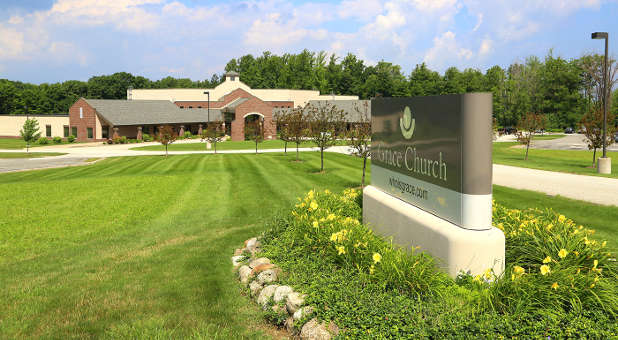
I recently met Derek Sanford, the lead pastor of Grace Church (Pennsylvania) and we quickly became friends. He was seeking advice on developing leaders, and in the midst of our conversation I became quite intrigued with the vision of Derek's team for developing staff-level volunteer leaders.
I asked him if he would do a guest-post interview:
DR: Tell us a little about Grace Church.
DS: Grace Church is in McKean, Pennsylvania, right on the shores of beautiful Lake Erie. It's breathtaking in the summer and VERY snowy in the winter. We're a 130-year-old church, but we don't act our age. About 1,400 people gather for worship at three different multi-site locations. We also have an online worship experience called Grace Online. Our dream is to multiply disciples, leaders, and locations along a 150-mile stretch of the lakeshore from Cleveland to Buffalo. We are also passionate about partnering with our city to address needs like education, poverty, and affordable housing.
DR: What is a volunteer leadership culture?
DS: About six years ago we realized that there was more ministry to do than we had staff to accomplish it. So, we asked two questions:
- Who are the high-capacity leaders in our congregation?
- Which ministries need leadership?
We came up with a list of people including the head of a local accounting firm, a retired president of an insurance company, a college professor, a school administrator, etc. We also listed our leader-less ministries like small groups, young adults, and community outreach. We wrote up some simple job descriptions, scheduled one-on-one recruiting lunches and cast the vision. To our surprise—most of them said yes! We've since come to realize that the biggest hurdle most ministry leaders have is assuming volunteers will say "no" to a big ask.
DR: How does a volunteer leadership culture actually work?
DS: In order to assign the proper authority to these volunteer roles, we decided to make them part of our staff. So, we moved our monthly daytime staff meeting to the evening so that people with outside jobs could attend. We gave them official church business cards, email addresses, work spaces, and listed their names in the bulletin as staff.
Today our staff meetings consist of about 85 people (25 paid and 60 volunteer). One volunteer leader has even been promoted to our 5-person staff management team, and he leads and oversees (and yes even does performance reviews) on four of our paid pastors.
DR: What are the benefits of a volunteer leadership culture?
DS: When you're not limited by the number of staff you can afford to pay, it's amazing how much ministry gets accomplished. In a multi-site context, staffing key roles with volunteers allows us to minimize our financial exposure when launching a new location. Our sites typically launch with one full-time site pastor and a part-time worship leader, and all other key positions (children, youth, small groups, guest experiences, etc.) are staffed with volunteer leaders. Another key benefit is that our volunteer leaders have a seat at the table for ministry decisions, which increases ownership with them and buy-in throughout the congregation.
DR: Is your current staff lean because of all the volunteer leaders?
DS: Actually no, we're not lean yet. In fact, we are still a little staff heavy for a church of our size. Most thriving evangelical churches have a ratio of 1 paid staff per 100 attendees—we're at about 1 to 60. But we anticipate a "tipping point" coming because of our ability to multiply ministry through volunteers. That point will probably come with the addition of our next couple of sites.
We currently have a mostly paid central staff, and as we continue to add multisite locations with only 1 1/2 staff persons per site—it won't be long before our staffing ratios become lean compared to other churches our size.
Conclusion
Next to the Holy Spirit, I believe the church's greatest resource is its people. But I also believe that the greatest untapped resources in most churches are high-capacity volunteer leaders. Many large churches have become too heavily dependent on paid staff and many smaller churches blame their lack of growth on their inability to pay more staff. The answer to both problems is sitting in the seats every Sunday: volunteer leaders.
Dan Reiland serves as executive pastor at 12Stone Church in Lawrenceville, Georgia. He previously partnered with John Maxwell for 20 years, first as executive pastor at Skyline Wesleyan Church in San Diego, then as vice president of leadership and church Development at INJOY. He and Dr. Maxwell still enjoy partnering on a number of church related projects together.
For the original article, visit danreiland.com.
Get Spirit-filled content delivered right to your inbox! Click here to subscribe to our newsletter.
Dr. Mark Rutland's
National Institute of Christian Leadership (NICL)
The NICL is one of the top leadership training programs in the U.S. taught by Dr. Mark Rutland. If you're the type of leader that likes to have total control over every aspect of your ministry and your future success, the NICL is right for you!
FREE NICL MINI-COURSE - Enroll for 3-hours of training from Dr. Rutland's full leadership course. Experience the NICL and decide if this training is right for you and your team.
Do you feel stuck? Do you feel like you’re not growing? Do you need help from an expert in leadership? There is no other leadership training like the NICL. Gain the leadership skills and confidence you need to lead your church, business or ministry. Get ready to accomplish all of your God-given dreams. CLICK HERE for NICL training dates and details.The NICL Online is an option for any leader with time or schedule constraints. It's also for leaders who want to expedite their training to receive advanced standing for Master Level credit hours. Work through Dr. Rutland's full training from the comfort of your home or ministry at your pace. Learn more about NICL Online. Learn more about NICL Online.


